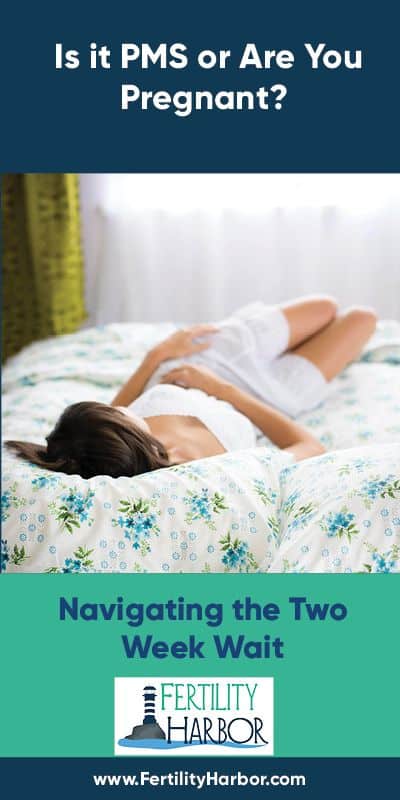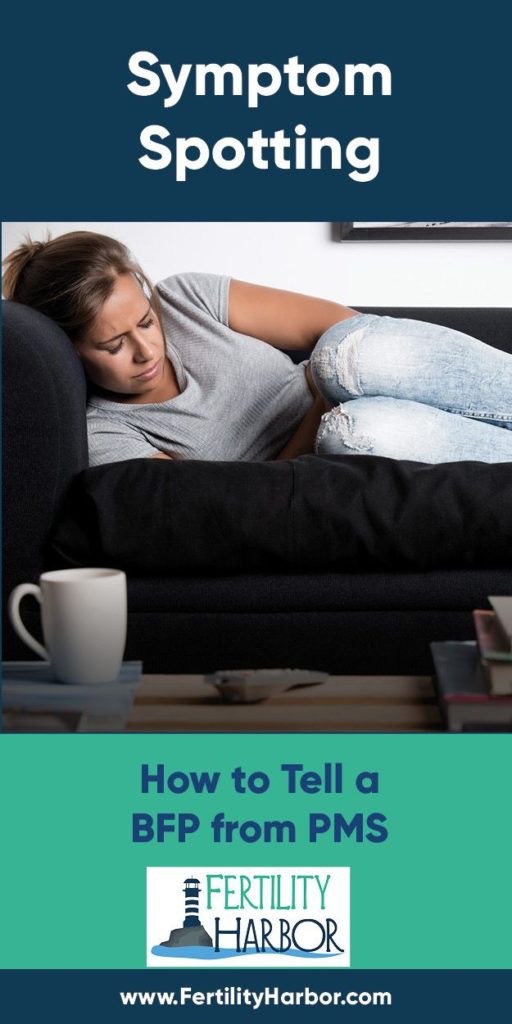This post was reviewed for medical accuracy by Rosalie Gunson, a Certified Registered Nurse Practitioner specializing in fertility care.
When you’re anxiously sitting in the two-week wait, it’s easy to obsess. You find yourself Googling “early pregnancy symptoms” over and over again, in case the little headache you had yesterday meant something.
How can you tell if anything you’re feeling is a pregnancy symptom or just the lead-up to your period? The answer is: You can’t. I’m sorry! I wish I had a crystal ball for you. But most early pregnancy signs are also PMS symptoms, because they’re caused by the same thing: rising progesterone.
The only way to know for sure is to wait until you can reliably take a pregnancy test — probably 14 days past ovulation. That might feel like an eternity now, but in the grand scheme of things, it’s really not very long.
Let’s go over some common pregnancy symptoms, as well as what it means if you don’t feel pregnant at all.
List of Common Early Pregnancy Symptoms
You have probably seen the following listed as common early pregnancy symptoms:
- Nausea
- Bloating
- Cramping
- Breast tenderness
- Fatigue
- Headaches
- Mood swings
- Sensitivity to certain tastes or smells
The problem is that most of them are also PMS symptoms, caused by higher levels of progesterone after ovulation.
That last one (sensitivity to tastes or smells) isn’t really a common PMS symptom, but it’s so subjective that it’s not a reliable sign. For example, if you’re in the two-week-wait and you’re suddenly desperate for tacos, it could mean you’re pregnant — but maybe you just want tacos. Tacos are delicious. Mmmmmmm tacos…
Okay, back to the point. There’s just no way to know if any of these symptoms mean anything until you can take a pregnancy test and be reasonably sure that the outcome will be correct. That means waiting until at least 14 dpo to take a home pregnancy test.
Is Bleeding an Indicator of Early Pregnancy?
You have probably heard about implantation bleeding. This is a form of spotting that indicates the fertilized egg has implanted in the uterus. Implantation typically happens around week 3 of your cycle, roughly a week after ovulation and a week before your period is due (give or take a few days).
Bleeding is not a reliable sign of pregnancy, though. Mid-cycle bleeding is pretty common for various unrelated reasons, and not everyone experiences implantation bleeding to begin with.
If you’re in your first trimester of pregnancy, some abdominal discomfort is normal, and a little bleeding is surprisingly normal as well. But you’re getting cramping + bleeding together, or the pain is severe, you should talk to your doctor. You might get a transvaginal ultrasound to make sure all is well. That scan will also help in determining your estimated due date (EDD). For more info on due dates with fertility treatment, check out Are Due Dates More Accurate With IVF?
As a side note, it’s possible to have quite a lot of bleeding and still have a healthy pregnancy. I actually know several women who went to the doctor or the emergency room convinced they were miscarrying, only to find out they were pregnant with twins!
Is a High Basal Body Temperature an Indicator of Early Pregnancy?
Another often-cited early pregnancy sign is elevated basal body temperature (BBT), which you’d only notice if you’ve been temping.You should notice a slight temperature rise the day after you ovulated. Your temperature will drop back down when you’re about to get your period, but it will stay high in pregnancy. That’s another effect of — you guessed it! — progesterone.
An elevated BBT for 16+ days after ovulation isn’t a foolproof indicator of pregnancy, at least not by itself. It’s possible that something else, including illness, could be causing your body temperature to be higher than normal.
In addition, a little bit of temping knowledge can lead you astray. For example, you could have misunderstood which day you ovulated. If you ovulated a little later than you thought, your period may not actually be late. Or you may not have taken your temperature consistently at the same time every day, before getting out of bed. It’s easy to draw the wrong conclusion if you’re not very careful with your temping regimen.
If you have very irregular cycles and you’re not sure when — or if! — you ovulated, my post When Do You Ovulate If You Have 45-Day Cycles? may be helpful. Should Regular Periods Be Considered a Vital Sign? also has some useful info.
I was never hardcore into temping, probably because I have PCOS and my cycles were all over the place anyway. I did the lazy version, which basically meant I temped for a few days before and after the trigger shot, and again for a few days before my expected period. When I did that, I saw a drop in my temperature right before my period showed up. It was a warning sign that a BFN was coming.
The Infertility Starter Pack page includes two essentials for temping: a good thermometer for taking your basal body temperature (Amazon link) and the iconic resource Taking Charge of Your Fertility (Amazon link).
Why Symptom-Spotting Can Be Hard for Fertility Patients
1) Fertility patients are usually taking a whole cocktail of hormones, especially progesterone.
Rising progesterone in the second half of the menstrual cycle causes a variety of symptoms. It’s very common for fertility patients to take progesterone supplements in the two-week wait (and beyond) to help support implantation and a growing embryo. Put those two facts together, and you can see why women doing fertility treatment would feel a lot of potential pregnancy symptoms.
It’s the drop in progesterone that brings on your period, so progesterone supplements can delay the arrival of your period if you’re not pregnant. Obviously, this is not terribly convenient for women hoping that their late period indicates a pregnancy! If you wait until 14 dpo to take a home pregnancy test, the results should be accurate — even if you haven’t gotten your period yet because of the progesterone.
Depending on your treatment plan, you may be taking other hormones besides progesterone in the two-week wait. IVF patients often take more medications than patients doing TI/ IUI cycles.
In addition, many women doing IVF experience bloating and weight gain after egg retrieval, which would be way too soon for it to be a sign of pregnancy. (If the bloating is severe, let your doctor know in case you need to be treated for ovarian hyperstimulation.)
2) Fertility patients may not be familiar with real PMS.
Many women doing fertility treatment are not used to having a healthy menstrual cycle. When you don’t usually ovulate, you don’t know what PMS feels like. Even if you had monthly bleeding on birth control pills, that wasn’t a real period and you didn’t have real PMS beforehand.
Now that you’re getting a real cycle, you may have more noticeable mood swings or feel more bloated than you did before the blanks week in your pack of pills. It’s really tempting to think anything unusual must be a pregnancy sign, but it could just be those pesky hormones messing with you!
I took birth control pills from age 18 to age 32, and before that I almost never got my period. So when I started having good ovulatory cycles thanks to fertility meds, I didn’t know what ovulation and PMS were supposed to feel like. Every little twinge felt like it could be significant.
What if You Don’t Feel Any Early Pregnancy Signs?
The list of possible pregnancy signs is long, and nobody feels every single one — especially in the early weeks. So don’t panic if you’re hoping to be pregnant and you feel absolutely normal! You might be one of the lucky ones who never gets morning sickness, or it might develop later on. You just never know.
To illustrate this point, here’s a list of 25 symptoms and whether I noticed them during my twin pregnancy:
- Fatigue — OH GOD YES!
- Moodiness — YES
- Brain fog — YES
- Nausea — YES — It felt like a creeping hangover
- Food cravings — YES, especially for Sour Patch Kids
- Food aversions — YES
- Breast tenderness — YES
- Headache — YES
- Round ligament pain — YES
- Leg cramps — YES, until I started taking magnesium daily
- Heartburn — YES, especially in the third trimester
- Increased urination — YES, especially in the third trimester
- Braxton-Hicks contractions — YES, especially in the third trimester
- “Lightning crotch” — YES, especially in the third trimester (I don’t know the real medical term for this, but trust me, you’ll know if it happens to you!)
- Linea nigra (a vertical line that may appear on your baby bump) — YES
- Stretch marks — YES, but only a few, and they showed up late in the pregnancy
- Sensitivity to hot weather — YES, but luckily I had winter babies
- Vomiting — Rarely
- Sensitivity to certain smells — Once that I can remember (to the smell of olives on pizza)
- Hypertension — Not until after the delivery (Yup, it’s possible to get gestational hypertension after the gestation is over!)
- Dizziness — No
- Metallic taste — No
- Bleeding/ spotting — No
- Swollen feet — No
- Gestational diabetes — No
See what I mean? I was having two babies at once, and I still didn’t have every single pregnancy symptom!
It’s really hard to generalize about pregnancy. The whole experience is different for everyone.
Pregnancy Symptoms That Show Up Later On
You won’t notice certain pregnancy symptoms until you are much further along — if ever. For example, stretch marks can happen if you gain weight for some other reason, but they don’t show up in pregnancy until you have a good-sized baby bump. Many women are not aware of Braxton-Hicks contractions at all, but if you get them, they’ll probably be in the third trimester.
Fetal movement is one of those symptoms that you can’t feel in the early weeks of pregnancy. If you’re sitting in the two-week wait, there’s no way you’re feeling the baby move around — that’s just psychological (or something else, like gas!).
Most first-time moms won’t be able to feel the baby’s fluttering movements until more like 20 weeks. That’s because the fetus is very, very small for the majority of the pregnancy. An 8-lb baby born at 40 weeks may have been less than 1 lb at 20 weeks gestation!
Conclusion
There’s really no way to tell whether anything out of the ordinary that you’re experiencing, from an upset stomach to a sudden craving for Doritos, is a sign of pregnancy or a sign that Aunt Flo on her way.
That’s especially true if you’re a fertility patient, because you’re probably taking a whole slew of hormones, and you may not have much of a baseline to go by. All you can do is try to distract yourself as best you can (Ha!) until it’s time to take that pregnancy test. Good luck!
Other posts you may find helpful:
Pregnancy Tests: Is It a BFN if the Second Line is Faint?
Can Ovidrel Cause a False Positive on a Pregnancy Test? (If you did a trigger shot)
8 Tips for Staying Sane During Infertility/ IVF
This post was last updated in May 2020.





 I’m Jenn! Here I am with my beautiful twin boys. My pregnancy was possible thanks to fertility treatment for PCOS.
I’m Jenn! Here I am with my beautiful twin boys. My pregnancy was possible thanks to fertility treatment for PCOS.


